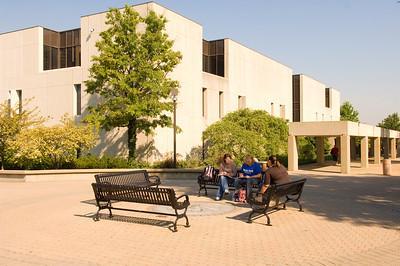
Dictionary Society of North America members will visit Indiana State's Cunningham Memorial Library and the Warren N. and Suzanne B. Cordell Collection of Dictionaries the evening of May 29 for a tour and dinner.

Dictionary Society of North America members will visit Indiana State's Cunningham Memorial Library and the Warren N. and Suzanne B. Cordell Collection of Dictionaries the evening of May 29 for a tour and dinner.
When the Dictionary Society of North America visits Indiana State University, a collection already the largest in the world will grow by one.
The society members will visit Indiana State's Cunningham Memorial Library and the Warren N. and Suzanne B. Cordell Collection of Dictionaries the evening of May 29 for a tour and dinner. During that visit Barbara Cordell will present a book to add to the collection her father started at the university. The program begins at 5:45 p.m. with the welcome and book presentation, followed by tours of the collection, then dinner.
This second visit by the society - the first was in 1977 - to the collection also begins the celebration of the collection's inception.
"The Cordell Collection is very keen on having the Dictionary Society of North America to visit it a second time to celebrate the impending 40th anniversary," David Vancil, head of special collections at the library, said. "Mr. Cordell was involved in the society himself and counted the members as his close personal friends. What better way to celebrate it them to have them visit and see what's happened over the last decades? We're especially happy to have his family members join us."
Nearly 13,000 volumes of dictionaries and word books make up the Cordell Collection.
"I've been working with it for 20 years and I haven't found another one that's close," Vancil said. "This particular collection is the world's largest of dictionaries and word books."
Warren Cordell graduated from Indiana State in 1933 with majors in math and physics. After pursuing post-graduate work at the University of Chicago, he went to work for the A. C. Nielsen Company, a pioneer marketing research organization. He ultimately spent 41 years with Nielsen before retiring in August 1978 as a vice president and chief statistical officer of the company.
One of Cordell's passions was collecting dictionaries. In December 1969, he donated 453 early English dictionaries to the university, thus beginning the collection that would soon total thousands of volumes. During the next 10 years he donated 3,232 editions totaling 3,913 volumes to the library. After Cordell died in 1980, his wife donated the remainder of her husband's lexicographical holdings, resulting in the addition of hundreds of titles.
The collection also includes the donation of 500 volumes from the Merriam-Webster Company as well as almost 500 volumes purchased from a National Endowment for the Humanities grant. The library continues to buy pre-1901 dictionaries and related materials each year to add to the collection.
The oldest items in the collection are a 1478 edition of "Vocabularius Breviloquus" by Johann Reuchlin and a 15th century manuscript titled "De Compendiosa Doctrina."
Although Vancil said "choosing a most interesting dictionary is like trying to pick a favorite child," he said Peter Roget's 1852 thesaurus stimulates curiosity because of Roget's handwritten notes inside. The notes add words or correct mistakes or insert different terms.
"We have the next edition but nobody's looked to see what made it into the next edition," Vancil said.
The Cordell Collection also includes more than 280 different editions and issues of Samuel Johnson's "A Dictionary of the English Language," originally published in 1755.
Warren Cordell conceived the collection as a way to study the development of the English language in published dictionaries and the tradition of lexicography which developed in Western Europe, according to library documents. It was also his view that the great written works of civilization were best understood by consulting meanings given in word books extant at or near the time of their creation.
However, other uses for the holdings have become evident. For example, as cultural productions, dictionaries and other reference works are particularly useful as socio-historical tools for studying British and American interaction with other cultures, according to Vancil. Inevitably, because of the great depth of the holdings, they serve researchers in many unrelated disciplines as a vast storehouse of definitions or keys to usage of words about which there might otherwise be only conjecture.
Vancil said although researchers come to use the collection from Canada, Finland, Italy and Poland, most researchers use the collection through the Internet.
"They find something and we photocopy or digitize it for them," he said.
The collection is open from 8 a.m. to noon and from 1 p.m. to 4:30 p.m. Monday through Friday or by appointment.
-30-
Contact: David Vancil, Indiana State University, head of special collections at the Cunningham Memorial Library, at 812-237-2611 or dvancil@isugw.indstate.edu
Writer: Jennifer Sicking, Indiana State University, assistant director of media relations, at 812-237-7972 or jsicking@indstate.edu